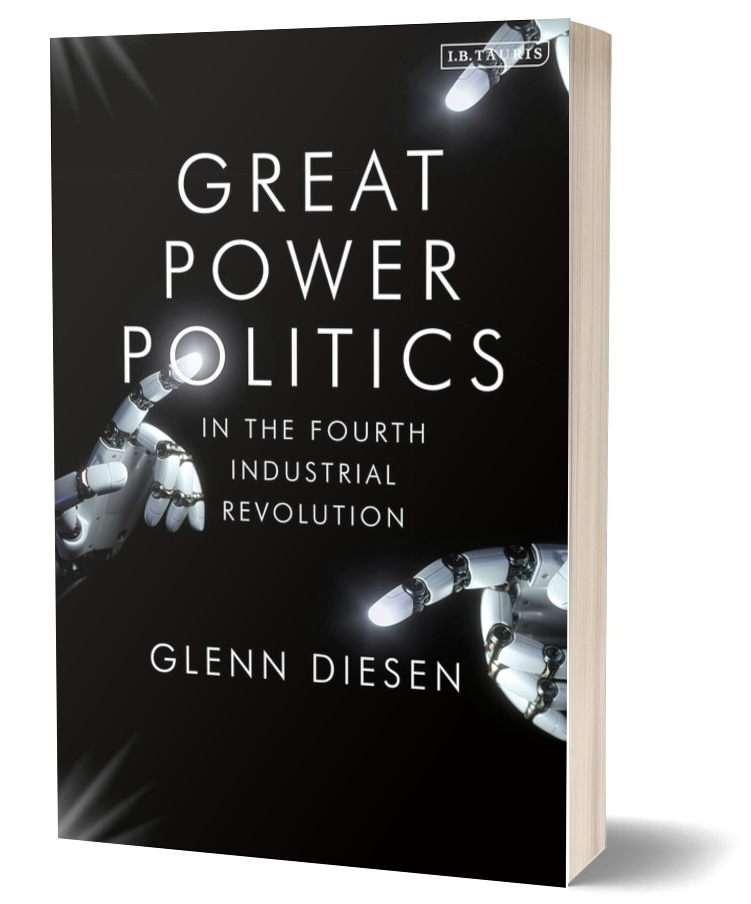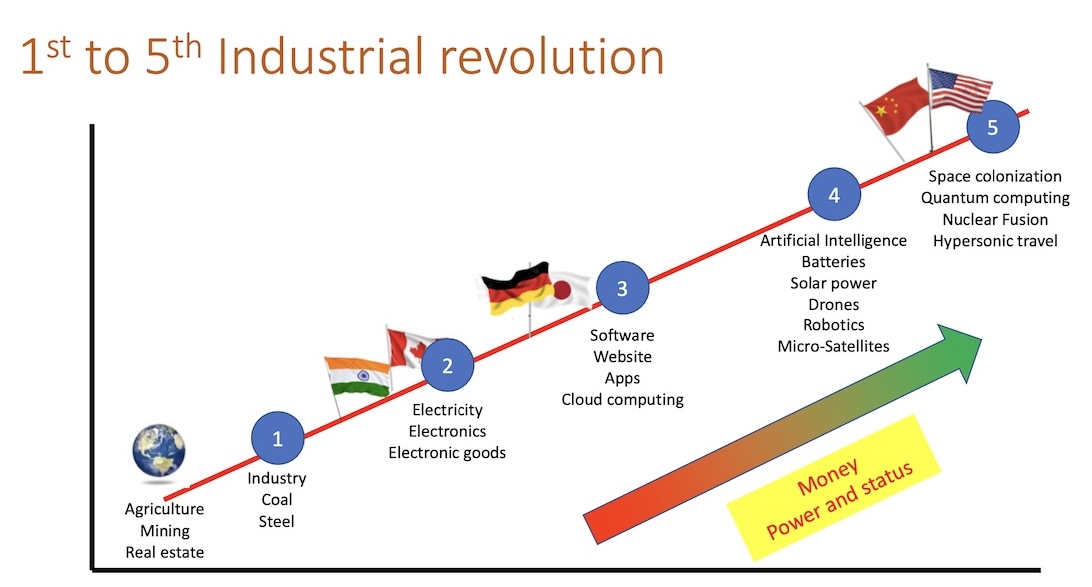Great Power Politics in the Fourth Industrial Revolution by Glenn Diesen
Summary and takeaways from the book.
Keywords:
Deep State
Wealth Transfer
Oct 7, 2024
Geoeconomics defines Great Power Politics.

ISBN: 978-0755607006
Published: March 25, 2021
Pages: 268
amazon
The author
Glenn Diesen Norwegian political scientist and professor at the University of South-Eastern Norway.
Foreword to the book is by Dr. Vladimir Yakunin, Head of the State Governance Department, Faculty of Political Sciences, Lomonosov Moscow State University.
The book is about 'Great Power Politics': the competition between the three dominant powers USA, China, and Russia. Only these three countries have technological and economic sovereignty. All other countries are subservient to them.
"
Methods of commerce are displacing military methods – with disposable capital in lieu of firepower, civilian innovation in lieu of military-technical advancement, and market penetration in lieu of garrisons and bases’."
"
The Fourth Industrial Revolution will increasingly elevate the strategic industries of man-made technologies above natural resources."
"
Geoeconomics represents the convergence of economics and security, with economic instruments of power used to advance security interests."
Geoeconomics defines Great Power Politics.
Weaponization of US Dollar and SWIFT payment systems, sanctions, tariffs, electronic chip restrictions etc. represents use of "
economic instruments of power used to advance security interests".
These are more powerful instruments of power than military.
"
Geoeconomics suggests that power derives from control over markets rather than military power and territory. Geoeconomics has traditionally focused on controlling strategic industries, transportation corridors and instruments for financial and economic cooperation."
Geoeconomics trumps Geopolitics.
Fourth Industrial Revolution

Fourth Industrial Revolution involves the use of disruptive technologies of our time such as AI, batteries, solar power, drones, robotics, micro-satellites, nano-technologies, etc. to acquire economic and military power.
"
We stand on the brink of a technological revolution that will fundamentally alter the way we live, work, and relate to one another. In its scale, scope, and complexity, the transformation will be unlike anything humankind has experienced before.
We do not yet know just how it will unfold, but one thing is clear: the response to it must be integrated and comprehensive, involving all stakeholders of the global polity, from the public and private sectors to academia and civil society."
Need for integrated and comprehensive response also means there will be a greater intervention of the State in the economy. The State will pick winners and losers.
It is for this reason that most large businesses are closely working with the government, and the government interferes deeply in every sector of the economy.
Techno-Nationalism
Sovereignty of a state rests on its Technological sovereignty. If a state is dependent on technology, then it will remain subservient.
Ability to scale is equally important. The state should be able to demonstrate ability to operate at scale at the highest level of technical complexity for it to have any degree of sovereignty. This is as important as military might.
It is "
velocity, scope, and systems impact". State should be able to innovate rapidly and move fast; do it at scale; and operate at level to have broad impact rather than just a narrow scope of expertise and capabilities.
The changes and growth are not linear but logarithmic. "
Common misconception about digital technology is the belief that it develops along a linear trajectory with the gradual development of existing technologies. Instead, the speed of development and subsequent application of computer technologies is accelerating exponentially."
"
Ultimately, the ability of government systems and public authorities to adapt will determine their survival. If they prove capable of embracing a world of disruptive change, subjecting their structures to the levels of transparency and efficiency that will enable them to maintain their competitive edge, they will endure.
If they cannot evolve, they will face increasing trouble."
"
Although the United States and China are now the main rivals for technological leadership, Russia’s historical aptitude for making a strong finish appears to repeat itself. Russia is carving out a great power position for itself with technological sovereignty to prevent the emergence of a United States–China bipolar international distribution of power.
The EU will similarly need to develop technological sovereignty to preserve its internal cohesion."
Need for technological sovereignty has given rise to Techno-Nationalism. Every state wants its own platforms and technology, and does not want others technology.
Financial and economic instruments
"
Financial and economic instruments are vital sources of geoeconomic power."
The Financial and economic instruments of the Fourth Industrial Revolution include "
digital solutions offering ‘banking without banks’ and cryptocurrencies circumventing national currencies."
"
The value of China’s mobile payments is eleven times greater than those in the United States. Payment apps are not easily implemented in the United States due to the immense inertia of the existing banking and financial system."
The Human Element
People are more important than ever as people are necessary for innovation. Governments should create the right environment for innovation to thrive otherwise they will be irrelevant.
"
Technologically advanced countries are capable of either educating or attracting talented individuals to work in a culturally and legislative environment that encourages innovation."
"
University education in the United States is also becoming too expensive and crippling student loan presents barriers to upskilling. With a low chance of return on their investment and a weak social safety net, young people will be less likely to risk obtaining higher education at such high cost.
Much of the problem the United States faces stems from investing more heavily in militarized geopolitics than in developing its geoeconomic power."
Global hegemony
"
After a state intervenes in the market to establish technological leadership, the hegemon advocates laissez-faire capitalism to cement its comparative advantage and bring the international economic system under its leadership. "
"
A clearly delineated international division of labour is cultivated by the geoeconomic hegemon, and in the absence of a hegemon, the division of labour breaks down."
Globalization, international division of labor, global supply chains, laissez-faire capitalism, Adam Smiths 'invisible hand of the market' etc. were the products of British and American global hegemony designed to stop the growth and development of others.
"
It is a very common clever device that when anyone has attained the summit of greatness, he kicks away the ladder by which he has climbed up, in order to deprive others of the means of climbing up after him. In this lies the secret of the cosmopolitical doctrine of Adam Smith."
"
Economic liberalism is dependent on a geoeconomic hegemon" and "The relative decline of the United States is compelling Washington to depend more on economic coercion, and this continues to erode its ability to act as an administrator of the international system."
The author gives an example: "As Japan climbed the technological ladder and value chains, the United States used the power of the state to counter the threat to its technological and economic leadership."
"
In 1985, the United States imposed 100 per cent tariffs on Japanese semiconductors. In 1987, Toshiba products were banned for three years in the United States. In 1989, Japan was required to share semiconductor technologies by opening its patents to the United States. In 1991, Japan had to agree to double the US share in the Japanese semiconductor market to 20 per cent. Even as it crushed Japan’s semiconductor industry on the pretext of unfair trade practices, the United States provided formidable support to domestic producers to reassert its international leadership."
Rise of Fascism: merger of corporations and State
Classic definition of Fascism is merger of corporations and State.
Geoeconomics, need for Technological sovereignty, decline of USA, and end of America's global hegemony has necessitated close relationship between the corporations and the State. This is fascism.
"
A few large corporations receiving state support will dictate the direction and health of the economy. This is an attempt to solve the dilemma of ensuring that large corporations wield influence internationally while remaining loyal domestically."
The author gives examples of Russia. "
Large state-owned energy corporations were deemed necessary to compete with large Western multinational energy corporations, and concurrently to prevent them from undermining the authority and interests of the state and the Russian people."
Another example from Russia: "
Subsequently, the state has obtained influence within Yandex to limit foreign ownership. Also, Yandex was pressured to form a partnership with Sberbank, a state-owned bank and a national leader in AI, to bridge Yandex with the state."
"
Technology is power, and the Fourth Industrial Revolution concentrates this power in the hands of only a few due to the economies of scope. Allowing private corporations to control this power undermines both the interests of the state and the people, but transferring some of this power to the state can have its own corrupting effect."
"Ultimately, the growing convergence of government and big business – in an attempt to ensure that the latter serves the national interest – resembles the political economy of fascism."
"
Furthermore, the rights of the people would be undermined in a power-sharing arrangement between private corporations. "
* * *
President Xi: "
change is coming that hasn't happened in 100 years, and we are driving this change together".
President Putin: "
I agree".
Source.
"
The international system and domestic societies are not prepared for the disruptions of the Fourth Industrial Revolution."
"
Humanity faces the prospect of losing control over AI, mass unemployment, the collapse of capitalist democracy, political instability, cyberwarfare linked to the physical world, nuclear holocaust, unforeseen consequences of genetic manipulation and other dangers.
However, the status quo is also becoming untenable with humanity burdened with such problems as overpopulation, growing energy consumption, sectarianism, terrorism, environmental degradation, financial instability, scarcity of resources, the concentration of wealth, growing nihilism and others."
Related articles
The New Silk Roads: The New Asia and the Remaking of the World Order by Peter Frankopan
Conflict: The Evolution of Warfare from 1945 to Ukraine by Gen. David Petraeus, Andrew Roberts
External Links
